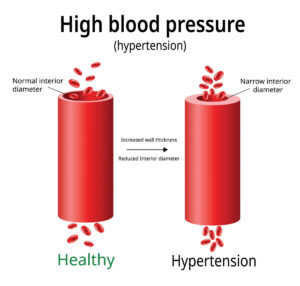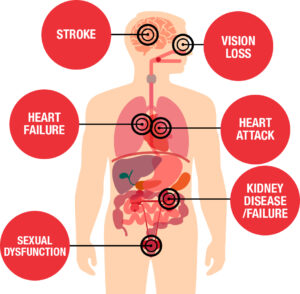High blood pressure is a very serious global health crisis, with roughly 11.8 million adults in the UK and about 1.3 billion people worldwide suffering from it.
It is often referred to as a silent killer because it typically has no symptoms until significant anatomical damage has been done, and that is rather daunting. Thus understanding how you can effectively manage high blood pressure is life.
Understanding High Blood Pressure
First things first, what is blood pressure? In layman’s terms, blood pressure is the force at which your blood pushes against the walls of your arteries as your heart pumps it.
It is measured in millimetres of mercury (mm Hg) and recorded with two numbers, namely systolic pressure (the pressure when your heart beats) over diastolic pressure (the pressure when your heart is at rest).
A normal blood pressure reading is usually around 120/80 mm Hg. High blood pressure, also known as hypertension, is diagnosed when readings consistently exceed 130/80 mm Hg.

Causes And Risk Factors
Several factors can contribute to the development of high blood pressure, including:
- Genetics: Yes, your family history plays a significant role in whether you suffer from high blood pressure, have healthy blood pressure, or struggle with low blood pressure.
- Age: Sadly, the risk of developing high blood pressure increases as you age due to the network of blood vessels (your vascular system) changing as you become older.
- Lifestyle: A poor diet, lack of physical activity, eating a lot of salt, being obese, smoking, and consuming an excessive amount of alcohol can drastically increase your risk of developing high blood pressure.
- Stress: We have all heard people say that stress is a killer, and it is! Chronic stress can contribute to elevated blood pressure. Not to mention, your body releases a surge of hormones when you are stressed, and these hormones cause your heart to beat faster and your blood vessels to narrow, increasing your blood pressure.
- Medical Conditions: Conditions like diabetes, sleep apnea, and kidney disease can increase your risk of developing high blood pressure.
Symptoms And Complications
High blood pressure often goes unnoticed until it causes serious health problems. Therefore having your blood pressure regularly checked is vital.
If left unmanaged, high blood pressure can cause damage to your arteries, thus reducing the blood flow to your heart. This can lead to a heart attack. Weakened blood vessels in your brain can also rupture or become blocked and cause a stroke. High blood pressure can cause the arteries around your kidneys to narrow, weaken, or harden, leading to kidney damage. And high blood pressure can cause problems with arousal and sexual performance.

How To Manage And Prevent High Blood Pressure
Managing high blood pressure is a lifelong commitment. It involves all hands on deck and requires you to stick to the new lifestyle changes you have made to prevent high blood pressure from wreaking havoc in your life.
Stick To A Healthy Diet
Heart-healthy eating can help lower your blood pressure. Try to eat a variety of fruits, vegetables, whole grains, lean proteins, and potassium-rich foods (bananas, potatoes, and spinach) while reducing your salt, red meat, and added sugars intake.
When it comes to sodium, aim to consume less than 2300 milligrams of sodium per day.
Commit To Getting Regular Exercise
Aim for at least 150 minutes of moderate-intensity exercise, such as brisk walking, or 75 minutes of vigorous-intensity exercise, such as running each week. You can also incorporate strength training exercises into your exercise plan at least two days per week.
Maintain A Healthy Weight
Losing even a small amount of weight can help reduce your blood pressure. Your body mass index (BMI) should ideally be between 18.5 and 24.9. To calculate your body mass index, take your height and divide it by your weight (BMI = kg/m2).
Limit Your Alcohol And Avoid Tobacco Intake
This really is a big one. If you must drink alcohol, drink in moderation. For women, that is up to 1 drink per day and 2 for men.
And since Nicotine raises blood pressure and your heart rate, try to quit smoking altogether and avoid secondhand smoke too. Your body will thank you.
Manage Your Stress
Chronic stress can contribute to high blood pressure. Techniques such as deep breathing, meditation, and yoga can help manage stress. Ensure you also get an adequate amount of sleep each night (that is more or less 7 to 9 hours of sleep).
Take Your Blood Pressure Medication
When lifestyle changes are not enough, medication may be prescribed to help manage your blood pressure, but by no means can you revert to your old lifestyle ways.
Common types of blood pressure medications include diuretics, beta-blockers, ACE inhibitors (angiotensin-converting-enzyme inhibitors), and calcium channel blockers.
It is important to follow all your doctor’s instructions and not to stop taking your medication without consulting with your doctor first.
Putting The Lid On Blood Pressure
High blood pressure IS a manageable condition.
By adopting a healthy diet, regular exercise, weight management, and stress reduction techniques, you can significantly reduce your risk of complications.
Remember to regularly monitor your high blood pressure, yes, even if you are young, as nearly 1 in 4 adults aged 20 to 44 actually suffer from high blood pressure, to ensure your lifestyle changes and medication is doing what it needs to do.
